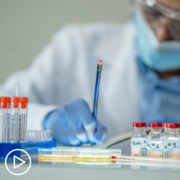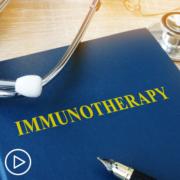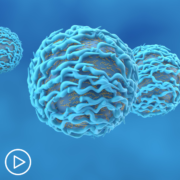CAR T-Cell Therapy Follow-Up Monitoring | What Patients Can Expect
CAR T-Cell Therapy Follow-Up Monitoring | What Patients Can Expect from Patient Empowerment Network on Vimeo.
What can CAR T-cell therapy patients expect for follow-up monitoring? Expert Dr. Krina Patel from The University of Texas MD Anderson Cancer Center discusses how long follow-up monitoring is typically carried out, issues that are monitored for, and proactive advice for patients to help ensure optimal care.
[ACT[IVATION TIP
“…for long-term side effects really is infections, number one, because even after I just saw a patient last week whose IgG level’s still less than 100 even a year after CAR T. We’ve just knocked out the good and the bad, and so it was just a higher risk of infection, so we try to prevent by giving IVIG regularly, and so again, any time you get an infection, just talk to your doctors, don’t say, ‘This is just a cold,’ just make sure that someone’s following.”
Download Guide | Descargar Guía
See More from [ACT]IVATED CAR T
Related Resources:

What Is the Impact of CAR T-Cell Therapy Access Barriers on Patients? |

|

What CAR T Research Is Ongoing to Improve Treatment Response? |
Transcript:
Lisa Hatfield:
Dr. Patel, if a patient is or has been part of a clinical trial involving CAR T, how long will that patient be followed under the clinical trial protocol for long-term effects, and this is especially important for people who see community oncologists and are wondering about any latent effects that they might experience, how long were those clinical trials follow those patients?
Dr. Krina Patel:
That’s a great question. So most trials will follow for at least two years just for toxicity, efficacy, now, most trials will follow until you’re relapsing, so that’s the point, is that we want to make sure this is working, that you don’t have any long-term toxicity, and when you relapse, we call that the progression-free survival, which is what most of the trials are looking at, and once you relapse, usually they’ll say, Okay, you’re coming off a trial because now you need other therapy and that could take years.
And however, for all CAR T products, because these are genetically modified, the FDA requires that you go into a long-term protocol where we’re monitoring for potential leukemias or lymphomas that T cells can cause, theoretically. So that is for 15 years, total. So everyone then is supposed to go on to that, now we can’t force you to go on to those, but it is something important because it’s come up recently that maybe some of these T-cell products are leading to leukemia or lymphoma, because we’re modifying those T cells could they themselves turn into a cell that causes cancer.
The theoretical risk has always been there, I will tell you that in reality, yes, there have been probably a handful of patients out of all the lymphoma and myeloma and leukemia patients who’ve been treated with CAR T where maybe it came from the T cell itself, the actual CAR T. The majority of other cases that have been reported, it’s been a low risk, it’s less than what we usually see in the general population of patients with blood cancers that get other blood cancers.
But when we see it, most of the time, it’s not in the T cell where the CAR was in, but again, a handful have been, and that is really why as a group, we have to be really careful and make sure that some of the different. The way we make CAR T is very different amongst the products, and to make sure that one product versus another isn’t more likely to cause T-cell leukemias or lymphomas. So that’s the main reason why that 15-year protocol exists.
Lisa Hatfield:
And do you have any tips for patients who maybe have undergone CAR T therapy, are several years out and working with our community oncologist, what should they be watching for in terms of any late in side effects or long-term side effects?
Dr. Krina Patel:
So I think the activation tip here for long-term side effects really is infections, number one, because even after I just saw a patient last week whose IgG level’s still less than 100 even a year after CAR T. We’ve just knocked out the good and the bad, and so it was just a higher risk of infection, so we try to prevent by giving IVIG regularly, and so again, any time you get an infection, just talk to your doctors, don’t say, “This is just a cold,” just make sure that someone’s following.
And the other big thing is your blood count, so if your blood counts start doing something crazy, your white count’s getting high or too low, you’re not on any therapy, your hemoglobin is getting really low, your platelets are getting low, that’s where we want to make sure there’s not a secondary cancer, a secondary blood cancer involved. Again, T-cell leukemia myeloma was really rare, but we have seen 10 percent patients with MDS or AML in the relapse refractory population, so that is something else we would still want to watch out for and make sure we don’t miss that.
Share Your Feedback
Create your own user feedback survey






